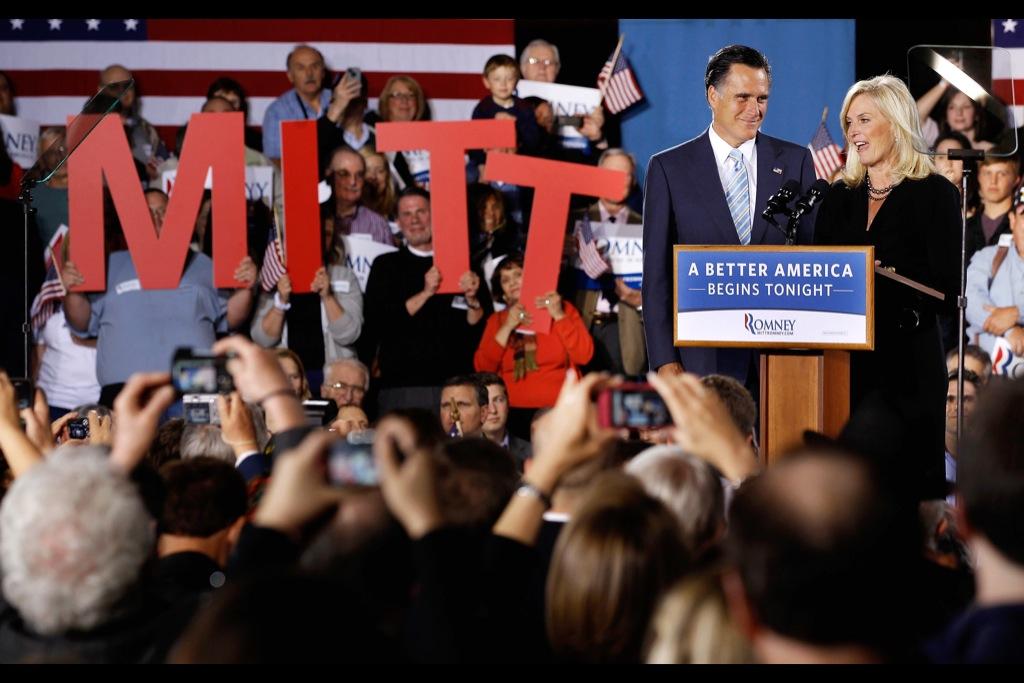Mitt Romney sweeps Tuesday’s primaries
Republican presidential candidate, former Massachusetts Gov. Mitt Romney and his wife Ann Romney (R) address a campaign rally titled ‘A Better America Begins Tonight’ at the Radisson Hotel April 24, 2012 in Manchester, New Hampshire.
To absolutely nobody’s surprise, Mitt Romney swept the five primaries held Tuesday, garnering more than 60 percent of the vote in New York, Connecticut and Rhode Island, and well above 50 percent in Delaware and Pennsylvania.
The night’s only real drama — would former Speaker of the House Newt Gingrich announce the end of his abortive, debt-ridden campaign — went unfulfilled when the candidate refused to concede, saying instead that he would proceed to the next battleground, North Carolina.
The former Massachusetts governor celebrated his victories in New Hampshire, where he delivered the first official speech of the general election. Called “A Better America Begins Tonight,” it was a preview of the themes and rhetoric that will most likely drive the campaign from now until November.
The “presumptive nominee” did not even pretend to be coy. He claimed his status as the Republican candidate fair and square:
“And tonight I can say thank you, America. After 43 primaries and caucuses, many long days and more than a few long nights, I can say with confidence — and gratitude — that you have given me a great honor and solemn responsibility. And, together, we will win on Nov. 6!”
The main themes of Romney’s campaign, judging by the Manchester speech, will be the economy and America’s greatness, issues designed to appeal to an electorate mired in financial distress and angry that their unquestioned position as world leader is under fire.
More from GlobalPost: The Argentine economy’s fuzzy math problem
“Tonight is the beginning of the end of the disappointments of the Obama years and the start of a new and better chapter that we will write together,” said Romney, to loud applause. “People are hurting in America. And we know that something is wrong, terribly wrong with the direction of the country.”
Romney rang the bell of patriotism and American exceptionalism, a safe haven from which to attack the incumbent:
“There was a time — not so long ago — when each of us could walk a little taller and stand a little straighter because we had a gift that no one else in the world shared. We were Americans … We knew it without question. And so did the world. Those days are coming back. That’s our destiny.”
The crowd in Manchester went wild.
In his speech Romney appeared to be channeling two other successful presidential candidates: Bill Clinton and Ronald Reagan.
“What do we have to show for three and a half years of President Obama?” he asked. “Is it easier to make ends meet? Is it easier to sell your home or buy a new one? Have you saved what you needed for retirement? Are you making more in your job? Do you have a better chance to get a better job? Do you pay less at the pump?”
This was a clear echo of Reagan’s attack on President Jimmy Carter during their final debate in 1980, in which he asked the simple yet devastating question: “Are you better off than you were four years ago?”
Reagan handily defeated the incumbent in that race.
More from GlobalPost: Romney triumphs in Puerto Rico
Romney also quite consciously introduced a popular mantra from another contest where an outsider defeated the incumbent: Clinton’s victory over George H.W. Bush in 1992.
Clinton’s political advisor, James Carville, had coined the phrase “It’s the economy, stupid,” to remind his candidate of where to focus his attacks. Tuesday night, Romney sounded the same theme: “It’s still about the economy,” he said. “And we’re not stupid.”
Thealso-rans in the Republican campaign have yet to jump on the Romney bandwagon. Gingrich is hanging on, saying that he wants to ensure a conservative platform at the Republican national convention, which will be held this August in Tampa, Florida.
Rick Santorum, who dropped out of the race two weeks ago, also stubbornly refused to endorse Romney. In an extended interview with CNN’s Piers Morgan, broadcast Tuesday evening, the former senator from Pennsylvania said only that he would “support the eventual Republican nominee.”
Morgan tried repeatedly to nudge Santorum into a formal endorsement, but Santorum held firm.
Significant interest still surrounds Romney’s choice of vice president. Various names have been floated, including Florida Senator Marco Rubio, South Carolina Governor Nikki Haley, Ohio Senator Rob Portman, and even Condoleezza Rice, former Secretary of State under George W. Bush.
Romney has major disadvantages with various constituencies, including women, Hispanics and African Americans, and may select a running mate based on his or her perceived ability to close those gaps.
More from GlobalPost: Illinois goes convincingly for Romney
There are 14 primaries remaining, including major states such as Texas (on May 29) and California (on June 5).
But, with the Republican nomination sewn up, all eyes will be on the contest between November’s contenders: President Barack Obama and Mitt Romney.
The “magic number” in play over the next few months is no longer the 1,144 delegates required for the Republican nomination. It is the 270 electoral votes needed to secure the White House.
We want to hear your feedback so we can keep improving our website, theworld.org. Please fill out this quick survey and let us know your thoughts (your answers will be anonymous). Thanks for your time!
